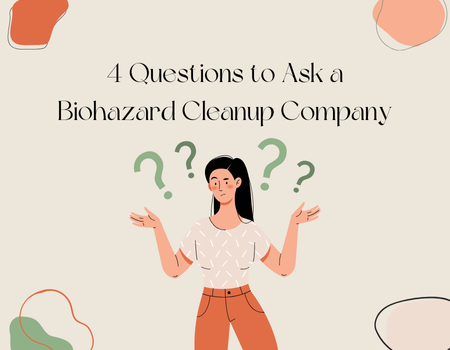Discovering a biohazard situation in your home or business can be a stressful and overwhelming experience. Whether it’s a crime scene, unattended death, sewage backup, or severe mold infestation, biohazards pose a serious threat to human health and require professional cleanup. Hiring a biohazard cleanup company ensures the safe and effective removal of hazardous materials and restoration of your property. However, with numerous biohazard cleanup companies available, choosing the right one can be daunting.
4 Questions to Ask a Biohazard Cleanup Company
-
 Are You Licensed and Insured?
Are You Licensed and Insured?
Licensing and insurance are paramount when choosing a biohazard cleanup company. Licensing verifies the company operates legally and meets specific industry standards. In the United States, regulations for biohazard cleanup can vary by state.
- Licensing: Ask the company for proof of licensing from the relevant state agency, typically the Department of Environmental Quality (DEQ) or a similar agency.
- Insurance: Ensure the company carries adequate liability insurance and worker’s compensation insurance. Liability insurance protects you from any damages caused by the company during the cleanup process. Worker’s compensation ensures the company’s technicians are covered if they sustain any injuries while working on your property.
- What Experience and Training Do Your Technicians Have?
Biohazard cleanup requires specialized skills and knowledge. Experienced technicians understand the proper protocols for handling various biohazards while minimizing the risk of exposure.
- Experience: Ask about the company’s experience level. How long have they been in business? What types of biohazard situations do they specialize in? Ideally, choose a company with extensive experience handling situations similar to yours.
- Training: Inquire about the training certifications held by the technicians. Look for technicians certified by the Institute of Inspection, Cleaning and Restoration Certification (IICRC) in areas like trauma scene cleanup or biohazard remediation. Additional certifications specific to biohazard handling, such as those offered by the Occupational Safety and Health Administration (OSHA), can also be beneficial.
- How Will You Handle the Cleanup Process?
A clear understanding of the cleanup process is important. It allows you to visualize what to expect and ensures the company follows proper procedures.
- Assessment and Scope of Work: Ask the company to explain how they will assess the biohazard situation and determine the scope of work. This includes identifying the type of biohazard, the extent of contamination, and the necessary steps for cleanup.
- Containment and Removal: Inquire about the containment procedures used to prevent further contamination during the cleanup process. Ask how they will safely remove and dispose of the biohazard material according to federal and state regulations.
- Cleaning and Disinfection: Understand the cleaning and disinfection methods the company employs. They should utilize hospital-grade disinfectants to ensure proper decontamination of the affected area.
- Deodorization and Restoration: Some biohazard situations can leave lingering odors. Ask if the company offers deodorization services. Depending on the severity of the biohazard event, restoration work may be necessary. Inquire if the company offers restoration services or will recommend qualified professionals.
- What is Your Pricing Like?
Biohazard cleanup can be expensive. Understanding the pricing structure and what services are included is essential for budgeting and avoiding unexpected costs.
- Pricing Structure: Ask for a detailed breakdown of the company’s pricing structure. This could be an hourly rate, a flat fee for specific services, or a combination. Inquire if there are additional charges for things like after-hours service or disposal fees.
- Services Included: Ensure you understand what services are included in the quoted price. This typically includes the biohazard removal, cleaning and disinfection, and disposal fees. However, some companies may charge extra for deodorization or restoration services.
Bonus Tip: Ask about Discretion and Compassion
Biohazard situations can be emotionally difficult. Choose a company that understands this and demonstrates empathy. Ask about their approach to maintaining discretion and respecting your privacy throughout the cleanup process.
By asking these four key questions, you can gain valuable information to select a qualified and reputable biohazard cleanup company. Remember, a responsible company will be happy to answer all your questions and provide detailed information about their services. Don’t hesitate to ask for references or reviews from past clients to get further insight into the company’s reputation and customer service.
